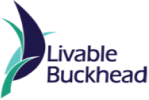Embodied Carbon in Buckhead: Defining the Vision
2025 Livable Buckhead Embodied Carbon Workshop
Understanding Embodied Carbon
Embodied carbon refers to the energy and resources required for the production, transportation, installation, maintenance, and disposal of building materials. These processes include mining raw materials, manufacturing construction products, and transporting them to the building site. Unlike operational energy use, which occurs over a building’s lifetime, embodied carbon is tied to upfront material and construction decisions, making it an important consideration for long-term efficiency and cost-effectiveness.
The built environment represents a major sector of the economy, with significant opportunities for efficiency improvements that can enhance profitability and competitiveness. By incorporating smart material selection, innovative construction techniques, and supply chain optimizations, developers and architects can reduce costs, streamline operations, and improve asset value.
Buckhead, known for its dynamic commercial environment and commitment to innovation, is positioning itself as a leader in high-efficiency, low-waste development. Through business-friendly policies, private-sector collaboration, and market-driven strategies, the community is advancing construction practices that prioritize material efficiency, durability, and economic returns.
Livable Buckhead’s mTAP Program
In collaboration with ULI Atlanta, Livable Buckhead has spearheaded two mini Technical Assistance Panels (mTAPs) focused on reducing unnecessary material waste and improving efficiency in construction. These workshops have brought together industry experts, policymakers, and developers to explore practical, cost-effective strategies for integrating these considerations into zoning and permitting processes. The program aims to:
- Encourage project teams to assess material efficiency and cost-saving opportunities early in the design process.
- Develop reporting frameworks to improve transparency and reduce inefficiencies.
- Implement practical reduction targets that enhance business value and streamline compliance.
- Establish Buckhead as a regional leader in forward-thinking, economically sound urban development.
On February 4, 2025, industry leaders, policymakers, and developers gathered at 3350 Peachtree, a Cousins’ property, for the Livable Buckhead Embodied Carbon Workshop. This event provided a platform for exploring strategies to enhance material efficiency and reduce waste in construction. Attendees gained actionable insights into cost-saving opportunities, business-friendly policy initiatives, and innovative building practices that improve asset value.
The Importance of Addressing Embodied Carbon
The Importance of Addressing Embodied Carbon
Presenter: Chris Perkes, Urban Land Institute Randall Lewis Center for Sustainability in Real Estate
Key Topics:
- Overview of ULI – Livable Buckhead mTAPs
The Importance of Addressing Embodied Carbon
Presenter: Alexandra Kirk, Jamestown
Key Topics:
- Business and community impact: Why reducing embodied carbon benefits business and provides market differentiation.
Designing a Climate-Positive Future: A Vision for Embodied Carbon
Presenter: Teresa Jan, Director of Climate Positive Design, Multistudio
Key Topics:
- Climate-positive design principles
- Practical strategies to reduce embodied carbon in building materials
- How design firms can lead the charge in sustainability
Case Study: Austin’s Approach to Embodied Carbon
Presenter: Greg Arcangeli, Austin Energy
Extended session with insights, including:
- Austin’s building material data collection
- Strategies for encouraging Environmental Product Declaration (EPD) reporting
- Compliance with Austin Energy Green Building (AEGB) program and lessons learned
- Insights into benefiting the development community and policy implications
Embodied Carbon in LEED v5
Presenter: Dustin Mason – U.S. Green Building Council
Key Topics:
- Proposed embodied carbon reporting requirements for the upcoming LEED v5
Resources & Next Steps
Buckhead is taking decisive action to lead the way in smart, high-value development. Through these efforts, businesses can improve efficiency, reduce waste, and enhance the long-term value of their projects.
For further information and to get involved, contact Helen Petersen


